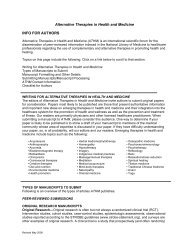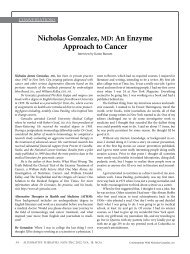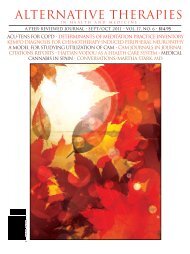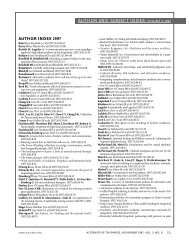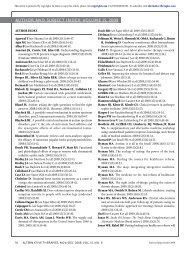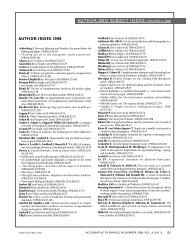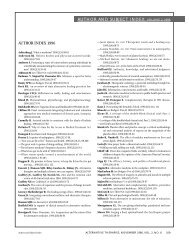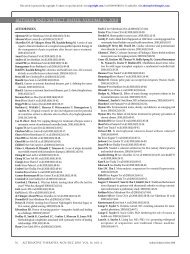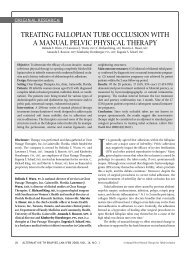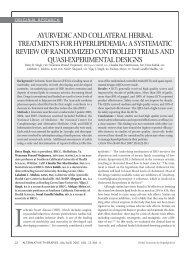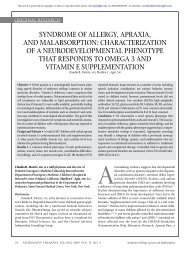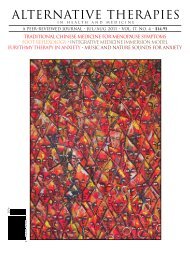Alternative Therapies In Health And Medicine
Alternative Therapies In Health And Medicine
Alternative Therapies In Health And Medicine
You also want an ePaper? Increase the reach of your titles
YUMPU automatically turns print PDFs into web optimized ePapers that Google loves.
TABLE 2 Comparison of Study Outcomes in Treatment Groups*<br />
KBW Group (n = 22) ACU+KBW Group (n = 20) HT Group (n = 15)<br />
Item<br />
Pretreatment<br />
Posttreatment<br />
Mean<br />
difference<br />
Pretreatment<br />
Posttreatment<br />
Mean<br />
difference<br />
Pretreatment<br />
Posttreatment<br />
Mean<br />
difference<br />
Kupperman score 19.68 ± 7.41 11.09 ± 5.23‡ 8.59 25.80 ± 9.63 11.25 ± 7.36‡ 14.55 18.73 ± 8.12 7.6 ± 6.04‡ 11.13<br />
FSH (IU/L) 55.93 ± 28.95 47.08 ± 38.22§ 8.84 55.48 ± 27.58 41.29 ± 25.81† 14.18 80.78 ± 34.55 48.37 ± 30.65† 33.40<br />
E2 (Pg/mL) 49.23 ± 58.92 76.13 ± 82.54§ 26.9 55.58 ± 62.88 76.01 ± 84.09§ 20.42 14.72 ± 25.39 42.55 ± 49.77§ 27.83<br />
Number of symptoms 7.40 ± 2.15 5.54 ± 2.64† 1.86 8.95 ± 2.39 5.55 ± 2.96† 3.40 6.46 ± 1.64 3.80 ± 2.21† 2.66<br />
Abbreviations: KBW, Kun Bao Wan; ACU, acupuncture; HT, hormone therapy; FSH, follicle stimulating hormone; E2, estradiol.<br />
*Values are given as mean ± SD.<br />
†P < .05, compared with pretreatment in the same group.<br />
‡P < .001, compared with pretreatment in the same group.<br />
§Not significant, compared with pretreatment in the same group.<br />
tion of decrease in Kupperman score was 8.59 ± 6.005 in CHM,<br />
14.55 ± 8.46 in ACU + CHM, and 11.13 ± 5.80 in the HT group.<br />
The mean difference in Kupperman score was compared between<br />
baseline and after 2 months among the three groups using oneway<br />
ANOVA tests, which revealed that the effect of the three<br />
treatments on Kupperman score was different (P = .02). Tukey’s<br />
HSD test showed that the only difference was between the ACU +<br />
CHM group and the CHM group (Table 3), meaning that ACU +<br />
CHM decreased the patients’ Kupperman score significantly<br />
more than did CHM alone. There was no significant difference<br />
between HT and the two other treatments.<br />
Comparison of Serum Levels of Follicle-stimulating Hormone<br />
and Estradiol Among Groups<br />
After treatment, the level of FSH decreased in the ACU + CHM<br />
group and the HT group significantly (P < .05; Table 2), but CHM<br />
alone didn’t result in any significant decrease in the level of FSH (P<br />
> .05). The level of E2 did not indicate any significant increase in<br />
any group (P > .05; Table 2).<br />
The mean difference in FSH levels was compared between<br />
baseline and after 2 months among the three groups. According to<br />
a one-way ANOVA, the effect of three treatments on the level of FSH<br />
was different (P = .021). Tukey’s HSD test showed that this difference<br />
was only between CHM group and HT group with significantly<br />
better results for HT. There was no significant difference between<br />
either the ACU + CHM and HT groups or between ACU + CHM and<br />
TABLE 3 Comparison of Kupperman Score and FSH Between 3<br />
Treatment Groups*<br />
Group Kupperman Score FSH<br />
KBW and ACU+KBW .02 .80<br />
KBW and HT .46 .02<br />
ACU+KBW and HT .40 .075<br />
*Amounts are P values obtained from Tukey HSD test.<br />
Abbreviations: FSH, follicle stimulating hormones; KBW, Kun Bao Wan;<br />
ACU, acupuncture; HT, hormone therapy.<br />
CHM groups in decreasing the level of FSH (Table 3). The mean difference<br />
in the level of E2 between baseline and after 2 months<br />
among the three groups was not significantly different (P = .96).<br />
Comparison of Number of Symptoms Among Groups<br />
All three groups showed a significant reduction in the number<br />
of symptoms from the pretreatment to the posttreatment stage,<br />
according to paired t-test (P < .05 in CHM group and P < .001 in ACU<br />
+ CHM and HT groups; Table 2). The mean difference in the number<br />
of symptoms was compared between baseline and after 2 months<br />
among the three groups using one-way ANOVA, which yielded no<br />
significant difference (P > .05).<br />
Adverse Results<br />
None of the patients developed any adverse reaction during the<br />
2 months of treatment.<br />
DISCUSSION<br />
Concerns about the safety of hormone therapies have led to<br />
demand for alternative options by women experiencing menopauserelated<br />
symptoms. Among alternative therapies, acupuncture and<br />
CHM are vastly popular with middle-aged women in China and<br />
around the world. Many clinical trials have found acupuncture effective<br />
in the treatment of menopause-related symptoms. However,<br />
those studies with sham acupuncture as a control did not find any<br />
superiority for acupuncture over sham acupuncture. The findings of<br />
this study confirm the results of those studies that found acupuncture<br />
effective in the treatment of menopause-related symptoms.<br />
Among them, two similar studies by Xia 19 and Qin 20 observed that<br />
electroacupuncture significantly decreased the Kupperman score,<br />
achieving relatively the same success as the hormone therapy.<br />
Likewise, it decreased the level of FSH and increased the level of E2.<br />
Although this study confirms the decrease in Kupperman score and<br />
FSH due to acupuncture, it does not confirm their findings concerning<br />
E2 level. Another study by Jin et al 21 examined the effect of acupuncture<br />
at the five-zangshu points vs Premarin (conjugated<br />
estrogens), which found a considerable decrease in Kupperman<br />
score and increase in E2 for both treatments, with significantly better<br />
results from acupuncture. The current study corroborates their<br />
Menopause: Traditional Chinese <strong>Medicine</strong> vs Hormone Therapy<br />
ALTERNATIVE THERAPIES, jul/aug 2011, VOL. 17, NO. 4 51



